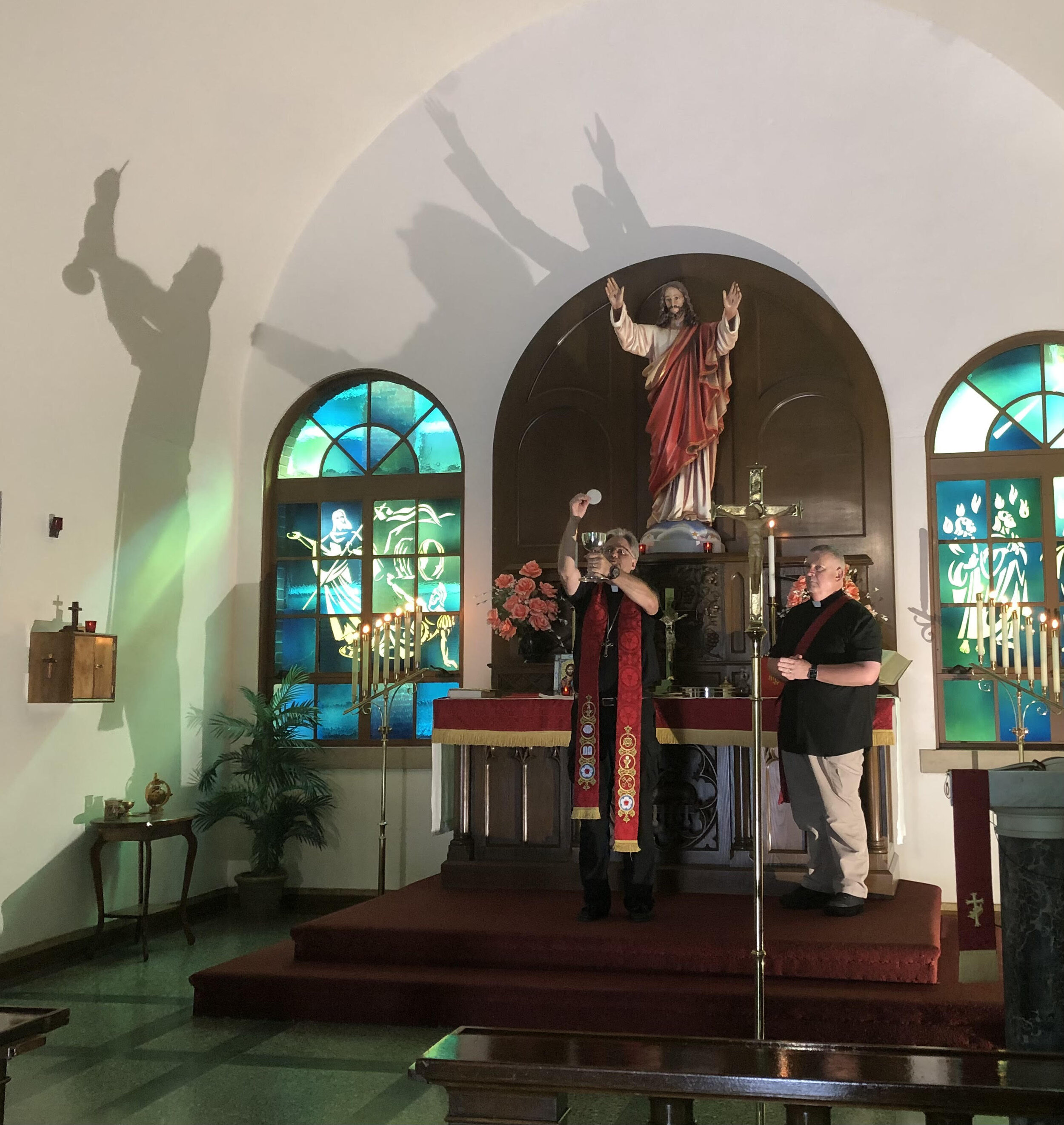Episodes
![[Gottesblog] The Flexibility of the Liturgy — Larry Beane](https://pbcdn1.podbean.com/imglogo/image-logo/332069/G_logo_1500_f5mj7a_300x300.jpg)
Sunday Oct 17, 2021
[Gottesblog] The Flexibility of the Liturgy — Larry Beane
Sunday Oct 17, 2021
Sunday Oct 17, 2021
The Flexibility of the Liturgy

The detractors of The Gottesdienst Crowd often create a caricature of our advocacy for liturgy, and then beat the stuffing out of that strawman. They accuse us of simply promoting “what we like.” We have been called “liturgical pietists” and “chancel prancers.” We’re accused of legalism and inflexibility.
The sad part is that our detractors are missing the great benefits and blessings of the liturgy.
We know that the liturgy teaches, as ceremonies are catechetical, according to our confessions. The liturgy is inclusive, as people all around the world can gather together to give praise and glory to God, and to receive His sacred gifts - even if there is a language barrier. The liturgy is truly “unity in diversity” in a good and edifying sense. The liturgy does not exclude young children, the handicapped, people of vastly different cultures, or people suffering with cognitive disabilities. The liturgy doesn’t focus on one form of pop music to the exclusion of everyone else outside of one target demographic. The liturgy is portable, requires no special equipment, and can be done in adverse conditions.
This year, my congregation, Salem Lutheran Church in Gretna, Louisiana missed the Sunday Divine Service for August 29: the Feast of the Martyrdom of St. John the Baptist. We cancelled service because we found ourselves in the path of what was being predicted to be a possible Category 5 hurricane which was given the name “Ida.” The Feast of the Martyrdom of John was also the 16th anniversary of when we were hit by Hurricane Katrina back in 2005 - two weeks after I received my call to serve at Salem.
So those of us who did not evacuate made our preparations, gassed up our generators, prayed, watched, and waited. Our deacon and his wife opened their home to several members of the parish, as they have a whole-house generator. The next day, after the storm hit and passed not far to our west, my wife and I headed over to the deacon’s house for fellowship and the mutual consolation of the brethren.
I grabbed some hymnals and my Treasury of Daily Prayer. We gathered in the living room, and I led a Matins service. Several of us knew the service, others did not. We simply followed the liturgy in the hymnal, the lectionary in the Treasury, and I read the assigned meditation for the day. The Lord spoke to us in Psalm 29:1-4, 10-11 (which we chanted) . He reminded us of His power over thunder, water, and floods, and that He is enthroned in the heavens:
Ascribe to the Lord, O heavenly beings,
ascribe to the Lord glory and strength.
Ascribe to the Lord the glory due his name;
worship the Lord in the splendor of holiness.
The voice of the Lord is over the waters;
the God of glory thunders,
the Lord, over many waters.
The voice of the Lord is powerful;
the voice of the Lord is full of majesty.
The Lord sits enthroned over the flood;
the Lord sits enthroned as king forever.
May the Lord give strength to his people!
May the Lord bless[a] his people with peace!
These were words of comfort from the Scriptures themselves. There were no puppet show, no gimmicks, no “children’s messages”, no jokes, no emotional pop music, and no hipster posing. We did not need a drum kit, guitars, nor even electricity (though we did have that thanks to the generator). We sang “Let All Together Praise Our God” (LSB 389), which takes our attention from ourselves and places it on the Most Holy Trinity, reminding us of our Lord Jesus Christ who “undertakes a great exchange, puts on our human frame, and in return gives us His realm, His glory and His name.” Some of us were were looking at the possibility of complete devastation of their homes and perhaps even massive losses of life in our area. The liturgy is appropriate in good times, bad times, times of joy, times of sorrow, times of intense anxiety, and times of relief.
The New Testament reading was 2 Corinthians 8:1-24, in which the apostle exhorts the Christians in Corinth to generosity, and reminds them of the selfless generosity of the churches in Macedonia…
in a severe test of affliction, their abundance of joy and their extreme poverty have overflowed in a wealth of generosity on their part. For they gave according to their means, as I can testify, and beyond their means, of their own accord, begging us earnestly for the favor of taking part in the relief of the saints.
After the storm, we were grateful to know that our sanctuary stood firm with no damage, but our school and church office buildings have severe roof damage, leaving us in a position of dire need. The Holy Spirit’s exhortation to generosity was once again something we needed to hear, as we are going to have to sacrifice for the sake of our church’s property.
The meditation for the day came from the Apology of the Augsburg Confession, Article 15, reminding us that “No tradition was set up by the Holy Spirit for the purpose of meriting the forgiveness of sins, or righteousness. Rather, they were instituted for the sake of good order in the Church.”
My parishioners that gathered to hear the Word of the Lord and to sing the Office of Matins ranged from a boy of nine to folks in their sixties. We come from different walks of life, but are united by the bonds of our confession and our status as baptized children of God in this place, facing these circumstances. We listen to different kinds of music, have different tastes in reading, and have a diversity of hobbies and interests. But we were able to unite around the ancient prayer offices, the constant and unchanging Word, a hymn that pointed us to Jesus, the cross, and the Gospel, and we heard anew the words of our confessions, which indeed are catechetical and confessional, but are also a proclamation and exposition of God’s Word.
Two days later, we would take the words of Apology 15 to heart as we gathered in our hot and humid sanctuary to celebrate the Feast of St. John’s Martyrdom as transferred to the midweek service. We usually hold our midweek Mass at 7:30 pm, but given the lack of power and the 6:00 pm curfew imposed to discourage both looters and driving in the pitch blackness, we moved the service to 4:00 pm. We fired up the generator and used two bright lights to illuminate the inside of the church. We ran a fan to circulate the air a bit. We gathered with hymnals in hand and sang the Common Service (Divine Service Three) a capella. We made a couple conservative changes based on our circumstances: lacking bulletins, we omitted the Introit and the Gradual, and we had no distribution hymns. Other than that, the liturgy was the same as it always is.
I preached a sermon based on the text.
Our sermon hymn was “By All Your Saints in Warfare” with the appropriate stanza to honor John’s martyrdom. We also sang “Now Thank We All Our God” as the opening hymn, and closed with the Common Doxology. Some of my parishioners wore shorts and tee shirts. I wore black pants and a black short-sleeve clergy shirt. I did not wear my usual cassock, alb, and chasuble. I wore a red stole. Traditions indeed provide for order in the church, and order is comforting when hurricanes come and bring destruction and change. Traditions anchor us to that which is unchanging. And yet, we have the Christian freedom to alter or modify traditions based on circumstances. To the contrary of the aforementioned straw man argument aimed at The Gottesdienst Crowd, we confess this flexibility and our Christian liberty, while not willy-nilly tossing our traditions that have served the Church for centuries. Indeed, especially in dire times and circumstances, tradition is a great comfort.
Christians can gather in the Divine Service in just about any circumstance, as our Lord instituted a simple, low tech rite: words, bread, wine. And embedded in the requirement of “words” is the liturgy, an unchanging and familiar dialogue between celebrant and people, familiar prayers between the people and God, and the comfort of the Word of God that does not change.
The consistency of the liturgy provides us with an anchor when the seas are tossing and turning, when the tempest rages, when death lurks, when the flesh rebels, and when the devil prowls. The old adage Repetitio est mater studiorum (Repetition is the mother of learning) is true. The more we know from memory, the better. Memorizing biblical passages, liturgical rites, and well-worn well-known hymns is a bulwark against tyrants who would conspire to rob our children and grandchildren of their faith.
A few weeks ago, the Gottesdienst editors held our annual retreat. Several editors and bloggers had to get back home, and so at the very end, we were left with five of us. We wanted to pray one more time together before our departure. We did not have enough hymnals to go around. That didn’t matter. We simply sang the service from memory, even singing in harmony.
Liturgy is not just for the Sunday service. It is also for small groups, for families, and for individuals. The Treasury of Daily Prayer is a flexible resource that can be used for family devotions, for the daily office, for the Psalter, for daily Scripture reading, and for meditations to use as one wishes. If one prefers Gregorian Chant, the Brotherhood Prayer Book is an excellent resource. Liturgy can be as simple or as elaborate as circumstances allow. And the Treasury is even accessible on your phone or iPad in the form of the Pray Now app.
The liturgy is God’s word given voice by both repetition and variety, by both tradition and flexibility. It is portable, requires no special technology or elaborate set-up. It can be memorized, sung by thousands, or it can be prayed silently, spoken, or chanted by an individual.
The liturgy reminds us, and allows us to partake in the reality that:
The voice of the Lord is over the waters; the God of glory thunders, the Lord, over many waters. The voice of the Lord is powerful; the voice of the Lord is full of majesty…. May the Lord give strength to His people! May the Lord bless His people with peace!
Amen.


No comments yet. Be the first to say something!